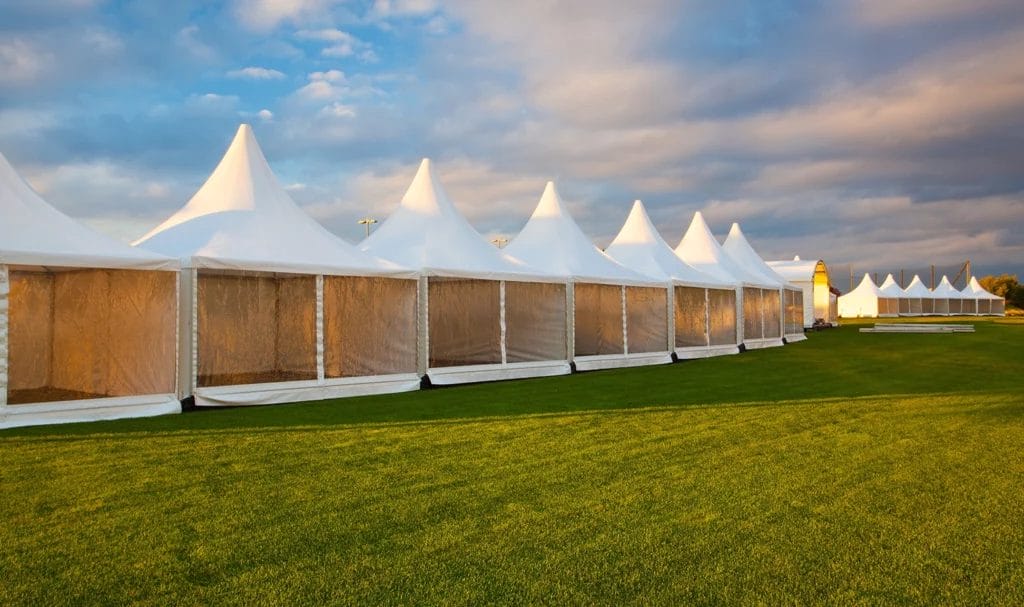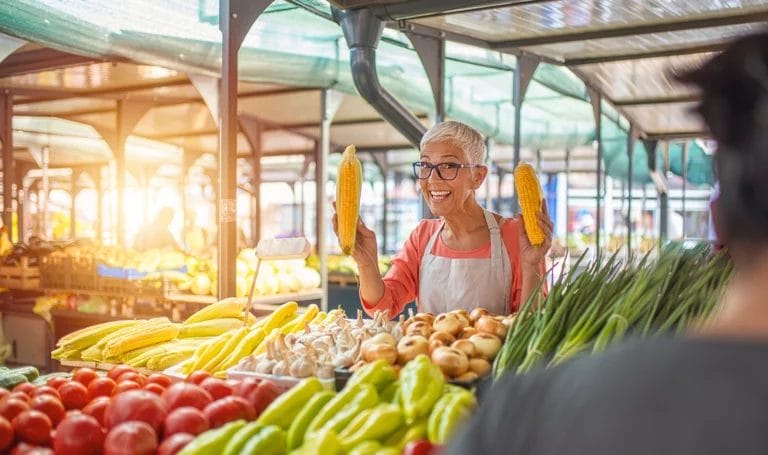Being a vendor is fun! The application process? Not so much. Before you get your booth up and running, it can feel like a juggling act just to get accepted.
From paperwork to permits and everything in between, we’ve got the scoop on the most common requirements you’ll see so you can breeze through your application and into your booth in no time.
What Does “Vendor Application” Mean?”
A vendor application is a formal submission that collects vendor information, including business details, products or services offered, and contact information. Organizers use this to determine whether the vendor aligns with the event’s theme, goals, and space requirements.
11 Common Requirements in Festival and Fair Vendor Applications
If you’re looking to join a fair or festival, there are a few requirements you’ll need to meet along the way. These ensure everything runs smoothly and that both vendors and attendees are kept safe and happy.
These are the 11 most common requirements you’ll likely encounter in a fair or festival vendor application:
1. Booth or Stall Setup Details
What it is:
Information about your booth or setup, including dimensions, structure type (tent, trailer, table, etc.), and electrical needs. You may also be asked to provide photos of your setup.
Why it’s required:
Event organizers need to know each vendor’s space requirements to ensure proper layout and safety within the venue.
2. Fees and Payment
What it is:
You often need to pay an application or booth fee to secure a spot at the event. This may also include a fee for utilities such as electricity or water.
Why it’s required:
This helps cover the cost of organizing and maintaining the event and ensures commitment from vendors.
3. Food or Product Description
What it is:
You may need to describe the products or services you plan to offer during the event, like food items, types of handmade products, or services offered (e.g., portraits, face painting).
Why it’s required:
This helps organizers determine whether the vendor fits the event’s theme, meets quality standards, and ensures product diversity among vendors.
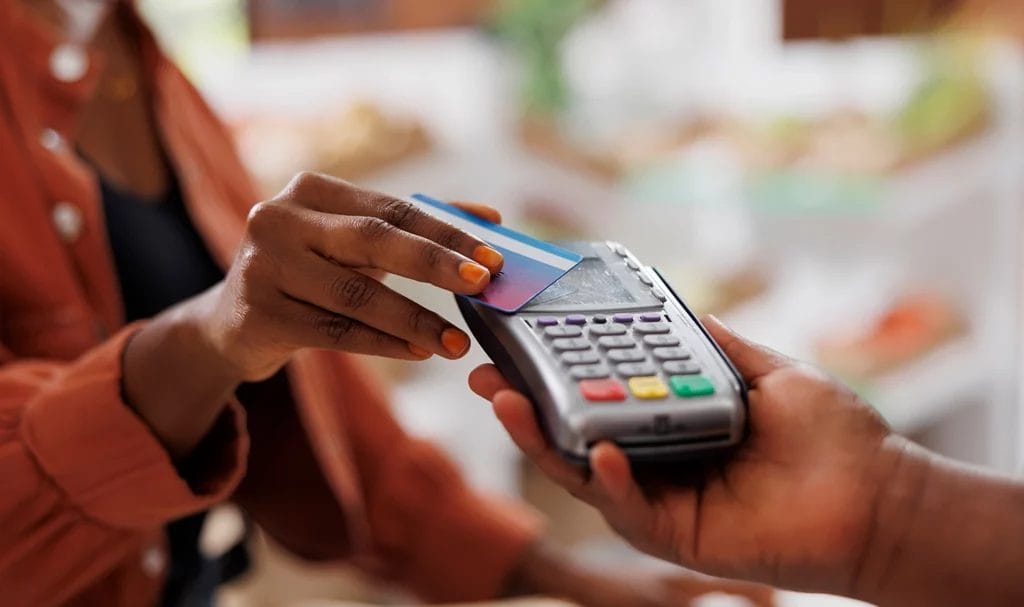
4. Taxes and Business Licenses
What it is:
You may need to provide proof of their business license and/or tax identification number (TIN) to comply with local or state regulations.
Why it’s required:
This ensures you are a legitimate business compliant with tax and legal requirements. Plus, some cities, states, or counties require events to mandate these things for tax purposes.
5. Fire Safety and Safety Plans
What it is:
You must provide fire safety plans, including how fire hazards will be managed (especially for food vendors or those using heating elements).
Why it’s required:
This promotes safety for vendors and attendees, particularly in crowded spaces or where flammable materials are involved.
6. Electrical or Gas Setup Details (for Food and Service Vendors)
What it is:
You must specify whether you need electricity or gas for your booth (e.g., for cooking equipment, lighting, etc.).
Why it’s required:
This helps organizers plan and ensure they have enough resources to meet each vendor’s electrical and fuel needs.
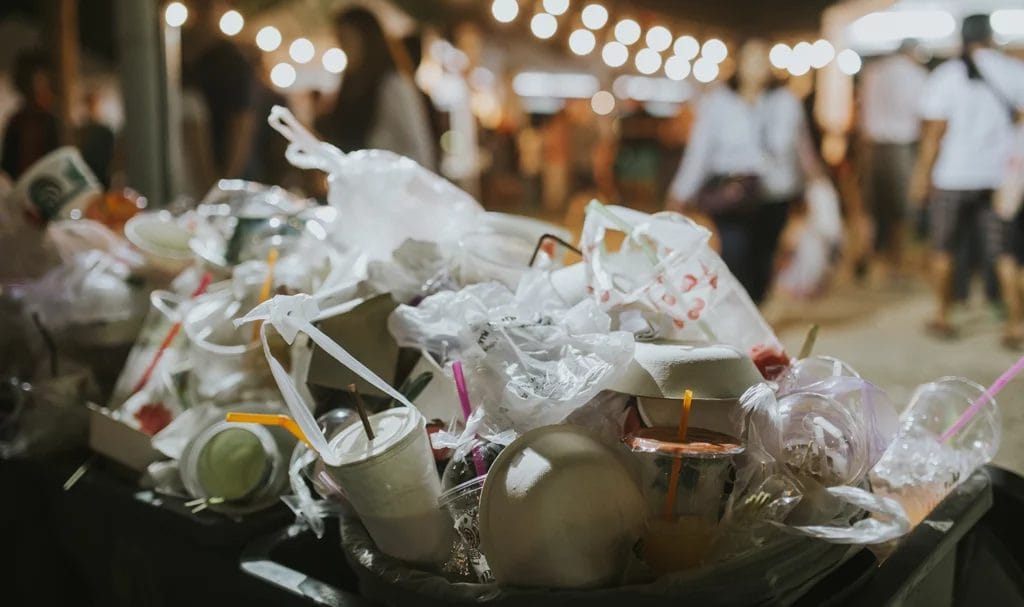
7. Waste Disposal Plan
What it is:
A plan for how you will manage trash, recyclables, or waste generated by your booth (e.g., food waste, product packaging, etc.).
Why it’s required:
This ensures cleanliness and helps the event maintain high environmental standards.
8. Marketing Materials or Samples
What it is:
Some fairs and festivals require you to submit photos or samples of your products for approval, particularly if you’re an arts and crafts vendor.
Why it’s required:
This ensures your products meet the event’s quality standards and are appropriate for the audience. It also helps organizers pre-plan floor space and assign booths based on product offerings.
9. Certificate of Insurance (COI)
What it is:
This is a document showing proof of general liability insurance, often required by the event organizers.
Why it’s required:
Festival vendor insurance protects both you and the event organizer from potential claims.
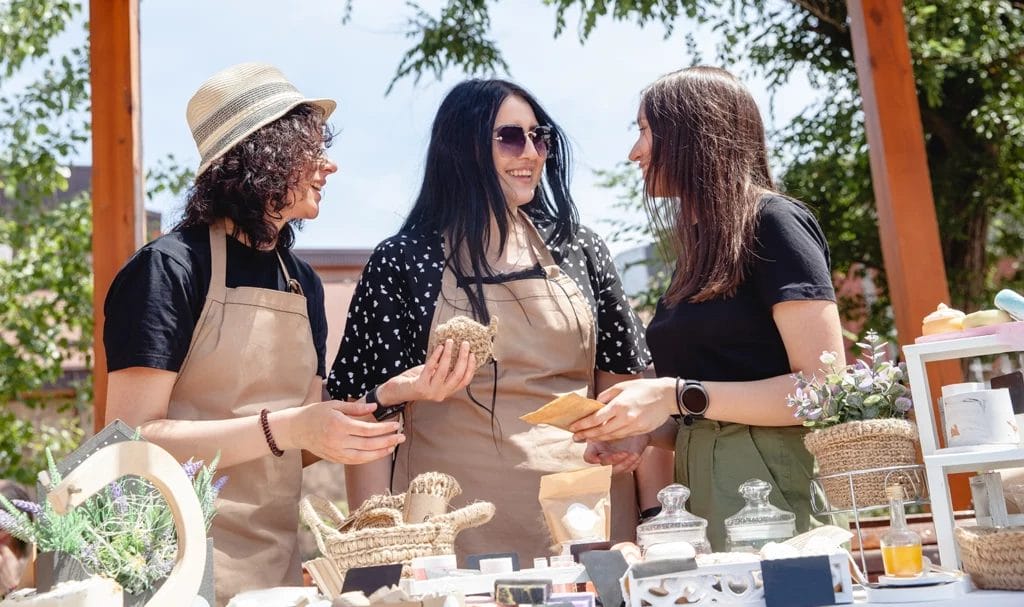
10. References or Reviews
What it is:
Some events may ask for references from past events or reviews of your products/services.
Why it’s required:
This helps event organizers assess your reputation and previous performance at similar events. Private events, juried art fairs, or large festivals are more likely to ask for this.
11. Event-Specific Restrictions or Requirements
What it is:
The event organizers set specific guidelines, such as restrictions on product types (e.g., no live animals or alcohol sales) or setup time frames.
Why it’s required:
These ensure all vendors adhere to event guidelines. While you do not have to provide this, it is more like terms and conditions you agree to follow, and it helps maintain the overall experience for attendees.
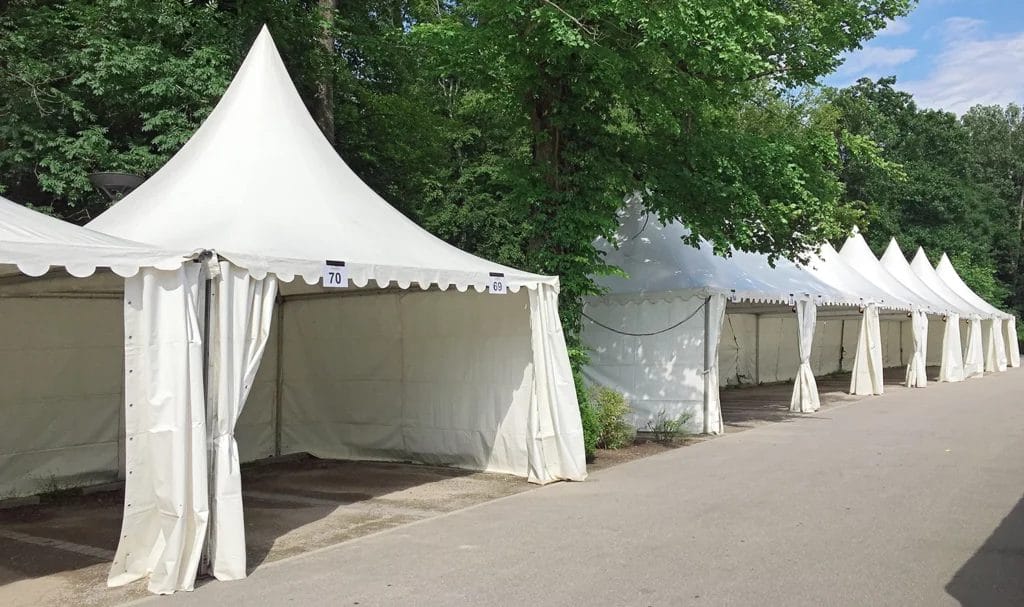
Additional Requirements for Food Vendors Only
Health Department Permits
What it is:
Food vendors are usually required to provide proof of health permits or food handling certifications issued by local health departments.
Why it’s required:
This ensures you comply with health and safety regulations to protect public health.
Food Safety Plans
What it is:
A document that outlines how food safety standards will be maintained during the event, including how food will be stored, prepared, and served.
Why it’s required:
This ensures the safe handling and preparation of food, reducing the risk of foodborne illnesses.
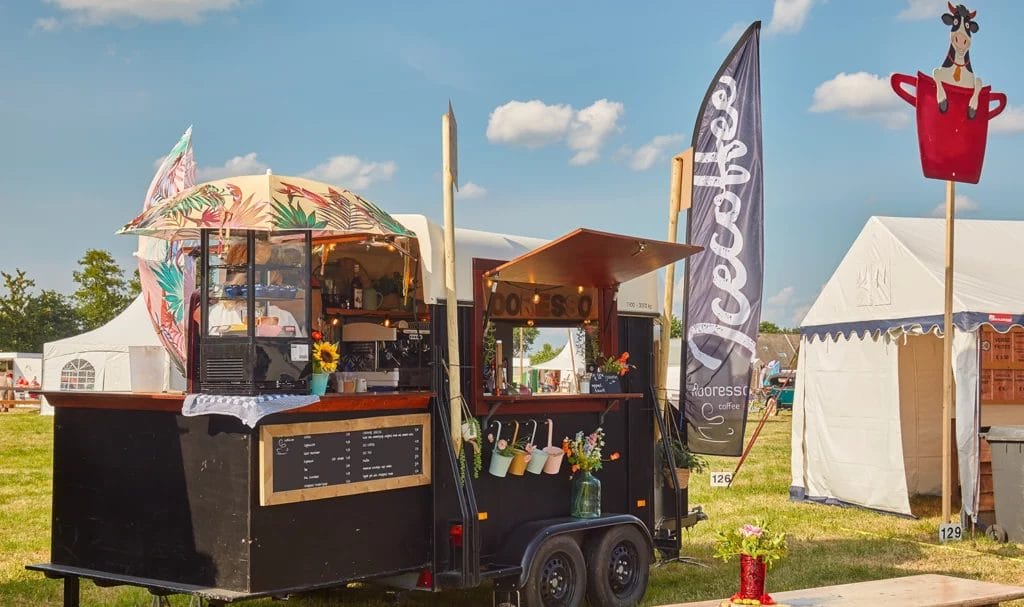
Common Insurance Requirements
The most common insurance requirement you’ll see listed for events is general liability insurance. You may be asked to provide a vendor Certificate of Insurance with the following coverage and limits:
✅ General Liability Insurance
$2 million aggregate | $1 million per occurrence limit
✅ Product Liability Insurance
$2 million aggregate | $1 million per occurrence limit
✅ Professional Liability Insurance
$2 million aggregate | $1 million per occurrence limit
✅ Liquor Liability Insurance
$2 million aggregate | $1 million per occurrence limit
✅ Damage to Premises Rented to You
$300K per occurrence limit
✅ Raised / Increased Limits
Up to $5 million aggregate | $5 million per occurrence
✅ Additional Insured Coverage
1 or more parties to be listed on your policy
✅ Theft and Damage Coverage (Inland Marine)
$2,000 aggregate | $2,000 per occurrence limit
Optional coverage for +$54 per event
Be sure to review the specific insurance requirements for the fair or festival you’re attending. Event organizers may have different coverage requests (especially regarding liability and alcohol). It’s always a smart move to be prepared with the right coverage!

Understanding the Festival Vendor Application Process
Event organizers typically have specific vendor application requirements, from permits and licenses to safety measures and product approvals. It’s crucial to carefully review and meet these requirements to secure your spot at the event and stay in line with all regulations.
Key Documents You’ll Need to Apply
Before you can submit your application, there are a few key documents you’ll need to have on hand first. These help streamline the process and make sure you’re ready to apply when the time comes:
- Certificate of Insurance: Proof that you are covered in case of an accident
- Business license: Proof that your business is legally registered and compliant with local regulations
- Tax identification number (TIN): Proof that your business is registered with the IRS for tax purposes
Additional permits required for food vendors only:
- Food handlers permit: Proof that you meet local health standards to prepare, serve, and sell food products
- Liquor license: Proof that you can store, sell, and distribute alcoholic products (may also include server/seller certifications or single event permits, depending on the state)
- Food safety plan: Outlines how you will store, prepare, and serve food safely
Pro Tip: Some events may not let you apply without providing proof or copies of these documents first. It’s best to look into vendor requirements before the application period opens to secure your stall ahead of the competition!

Event Fees for Vendor Applications
Budget for the cost of any required documentation, permits, or licenses you must obtain, as well as vendor event fees. Here’s what you can expect:
- Application fee: The cost to submit your application for consideration
- Space rental fee: The cost to reserve your booth, stall, kiosk, or rental space (can vary based on the size of the space)
- Additional space fee: Extra space needed to accommodate your business
- Electric, gas, or water fees: The cost to run certain utilities to your booth for your operations during the event
What to Expect During the Vendor Approval Process
The vendor approval process can vary depending on the event, but you can expect a few key steps along the way.
Ready…
After you submit your application, the event organizers will review your materials to ensure you meet their requirements.
Set…
You may be asked to sign a liability waiver, which protects the event organizer from legal claims related to accidents or damage caused by your booth or business.
VEND!
Once you’ve met all the requirements and signed any necessary documents, you’ll be approved as a vendor!
After receiving approval, you can expect to be assigned a booth, get instructions for set up and take down, and receive tax reporting instructions from the event organizers.
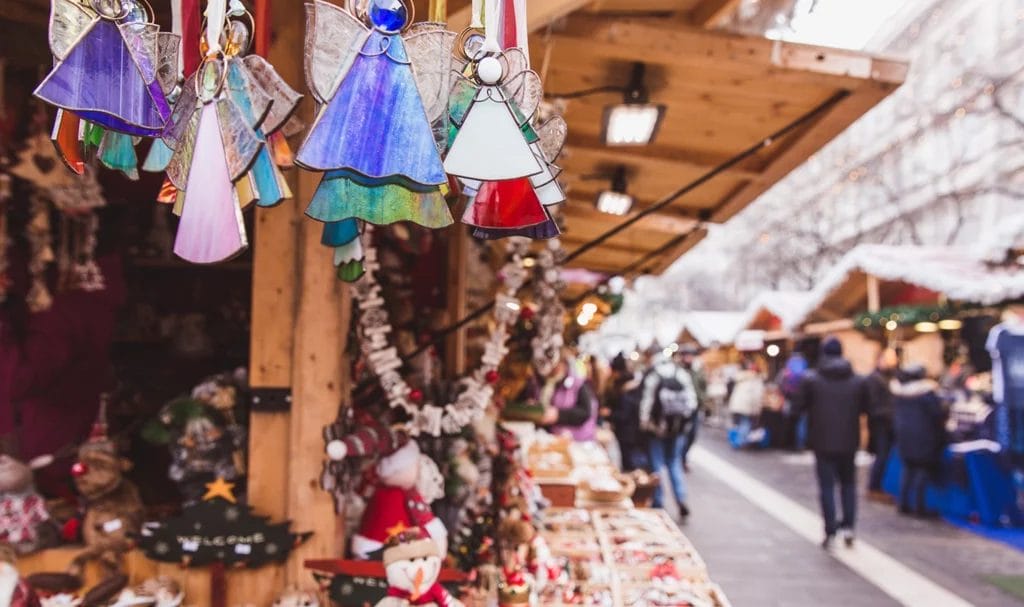
FAQs About Festival and Fair Vendor Applications
How Do I Become a Vendor at Festivals?
You can become a vendor at festivals by:
- Finding a festival: Research festivals that align with your products and check for vendor application details
- Reviewing the application: Each festival will have its own application process, so read through the details carefully
- Applying promptly: Submit your application with necessary documents (business license, insurance, photos) and highlight why you’re a great fit
- Waiting for approval: After submitting, await approval and event details like booth placement
How Do I Ask to be a Vendor at an Event?
You can ask to be a vendor at an event by:
- Finding the event online
- Applying through the designated vendor application process
OR
- Locating the contact information for the event organizer or vendor manager
- Sending a formal message that includes details about your business, photos of your booth and products, and why you’d be a great fit for the event
If the application deadline has passed or the event is no longer accepting vendors, there’s still a chance! Reach out and ask about any last-minute openings. If another vendor can’t make it, you just might snag their spot.
While this method doesn’t always guarantee a spot, it’s a great way to get your foot in the door with new events and audiences.
How to Be an Art Vendor at Festivals?
You can be an art vendor at festivals by researching festivals that focus on the arts and checking for vendor application details. Prepare your application by including high-quality images of your work, booth setup, and any necessary paperwork like insurance or business licenses.

